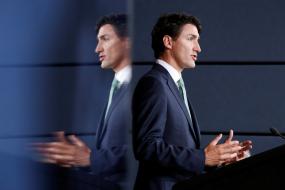MONTREAL — “Canada is back,” says Justin Trudeau, the charismatic and bilingual prime minister of Canada, at international gatherings, seeking to showcase the imprint he wants to put on Canadian foreign policy in contrast to that of his predecessor, Stephen Harper. The prime minister has used very precise terms in his speeches: justice, environmental care, democracy and human rights. He even dared to invoke some of them during his official visit to China in September, although the Chinese did not applaud him for it.
Mr. Trudeau, who was elected last year, has already taken some steps toward his ambitious agenda. He welcomed thousands of Syrian refugees, he included Canada in the fight against climate change, and he offered troops for United Nations peacekeeping forces. Latin America also began to feel the effects of this diplomatic turn. Starting in December, Mexicans will no longer need visas to travel to Canada. The Canadian government also announced an aid package for Colombia in the wake of the peace agreement there (although it is not clear what will happen to this aid now that Colombian voters have rejected the accord).
Trudeaumania moves forward with specific steps, a fresh style and velvety words. But Mr. Trudeau has been silent when it comes to one key issue for Latin Americans, an issue that has soiled Canada’s image with thick layers of sludge: the reprehensible behavior of mining companies in the region. Mr. Harper enthusiastically promoted Canadian participation in extractive industries beyond its borders, and in the last few years, between 50 percent and 70 percent of mining projects in Latin America have been carried out by Canadian companies.
Reports by the Council on Hemispheric Affairs and the Justice and Corporate Accountability Project have shown how some Canadian companies harm the environment, ignore the interests of indigenous communities, pressure governments to write favorable local laws, and support the criminalization of social protest, among other questionable behavior.
Guatemalan indigenous people accused Hudbay Minerals of being behind forced evictions, in which women were sexually assaulted and their homes burned (the company denies the allegations). In Zacatecas, Mexico, the Canadian mining company Goldcorp is being blamed for the contamination of aquifers and harm to wildlife. Similar problems have arisen in countries like Peru, Chile, Argentina, Panama and Honduras. The issue has been brought to the Inter-American Commission on Human Rights. Likewise, a United Nations report on Canada and human rights last year included concerns about the abuses of Canadian mining companies abroad.
With Mr. Trudeau as prime minister, any hope of ending these companies’ behavior has ebbed at times. In his campaign speeches he often stressed that his foreign policy would be the antithesis of Mr. Harper’s. As a member of Parliament, Mr. Trudeau voted for a bill to punish Canadian extractive companies that were involved in illicit behavior abroad. The bill was defeated by conservatives. But even as liberal members of Parliament haev come to power, they have yet to take up the issue again.
In April, Mr. Trudeau received a letter from more than 180 nongovernmental organizations in Latin America and elsewhere requesting that he regulate the behavior of Canadian mining companies abroad. Although Mr. Harper established a Corporate Social Responsibility Counselor in 2009, the office solely focuses on technicalities and on facilitating dialogue between companies and affected communities. Liberals deemed the initiative insufficient, but now in power, they still rely on it, and to this date, there has been no official answer to the letter sent to Mr. Trudeau.
During a recent visit to Mexico, Guatemala and Honduras, Stéphane Dion, Mr. Trudeau’s foreign affairs minister, said that the Canadian government wanted its companies to operate according to the same standards inside and outside Canada. However, there’s been no information on how it will achieve this goal.
Canadian companies are not the only ones at fault. The long list of Latin American problems contributing to this situation is well known: deficient judiciary systems, rampant bribery, an urge to create employment in spite of social, economic and environmental costs.
Nonetheless, the Canadian government is also responsible. Investigations by media and watchdog organizations find that Canadian authorities have vigorously backed Canadian mining companies abroad without having all the information that would guarantee the companies respect for human and environmental rights. Moreover, Canada is insisting that change is here, that the sun has come out after so many dark years of Mr. Harper’s administration.
Transition to a diplomacy that takes into account the multiple global concerns in Mr. Trudeau’s agenda is no easy task, particularly when it involves tweaking vital sectors of the Canadian economy. According to the Mining Association of Canada, the industry represented 3.5 percent of the country’s gross domestic product in 2014, while 66 percent of Canadian mining operations are abroad.
Mr. Trudeau is not the first politician to face such problems. As we know, matching words to deeds is proof of great political standing. Mr. Trudeau will do well to adhere to the principles that shape his worldview.
Recommendations in the reports to address the problems include a Canadian monitoring office that would have real power, the possibility of ensuring effective access to justice before Canadian institutions, allowing legal actions in Canada by individuals or groups harmed abroad to obtain justice and reparation, and an end to government sponsorship of companies involved in human rights violations.
By intervening, Mr. Trudeau would defend justice, environmental care, democracy and human rights. He has the opportunity to win permanent recognition from the millions who have welcomed his commitment to global issues. To do otherwise would be a colossal disappointment.
